
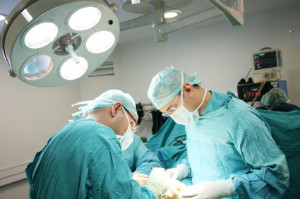
In recent years, minimally invasive surgery has garnered increasing attention as a potential solution for correcting foot and ankle deformities. Unlike traditional open procedures that require large incisions, minimally invasive surgery involves small, precise incisions. The anticipated advantages of this type of surgery include the preservation of blood supply, reduced harm to adjacent soft tissues, and a decreased incidence of wound complications. Minimally invasive surgical techniques can be performed for deformities such as flat feet, bunions, and hammertoe surgeries. If you have foot or ankle deformities, it is suggested that you make an appointment with a podiatrist to discuss whether minimally invasive surgery can help you.
Foot surgery is sometimes necessary to treat a foot ailment. To learn more, contact Dr. Edward D. Hutson of Easton, PA. . Our doctor will assist you with all of your foot and ankle needs.
When Is Surgery Necessary?
Foot and ankle surgery is generally reserved for cases in which less invasive, conservative procedures have failed to alleviate the problem. Some of the cases in which surgery may be necessary include:
What Types of Surgery Are There?
The type of surgery you receive will depend on the nature of the problem you have. Some of the possible surgeries include:
Benefits of Surgery
Although surgery is usually a last resort, it can provide more complete pain relief compared to non-surgical methods and may allow you to finally resume full activity.
Surgical techniques have also become increasingly sophisticated. Techniques like endoscopic surgery allow for smaller incisions and faster recovery times.
If you have any questions please feel free to contact our offices located in Easton, and Northampton, PA . We offer the newest diagnostic and treatment technologies for all your foot and ankle needs.
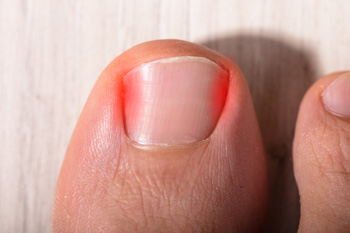
Within the world of common foot woes, ingrown toenails stand as a painful and bothersome issue that can disrupt daily life. These occur when the edges of a toenail grow into the surrounding skin, leading to inflammation and discomfort. Often stemming from improper nail trimming, wearing tight footwear, or genetic reasons, ingrown toenails can bring about pain, swelling, and possibly infection. Treating this condition involves gentle soaking, proper nail trimming techniques, and wearing comfortable, well-fitting shoes. In cases of infection, consulting a podiatrist is crucial in preventing complications. In more severe instances, surgical intervention may be necessary to provide long lasting relief. By understanding the causes and exploring the range of treatments, individuals can actively engage in preventing ingrown toenails. If you have developed an ingrown toenail, it is strongly suggested that you confer with a podiatrist who can offer you treatment methods that are correct for you.
Ingrown toenails can become painful if they are not treated properly. For more information about ingrown toenails, contact Dr. Edward D. Hutson of Easton, PA. . Our doctor can provide the care you need to keep you pain-free and on your feet.
Ingrown Toenails
Ingrown toenails occur when a toenail grows sideways into the bed of the nail, causing pain, swelling, and possibly infection.
Causes
Prevention
Because ingrown toenails are not something found outside of shoe-wearing cultures, going barefoot as often as possible will decrease the likeliness of developing ingrown toenails. Wearing proper fitting shoes and using proper cutting techniques will also help decrease your risk of developing ingrown toenails.
Treatment
Ingrown toenails are a very treatable foot condition. In minor cases, soaking the affected area in salt or antibacterial soaps will not only help with the ingrown nail itself, but also help prevent any infections from occurring. In more severe cases, surgery is an option. In either case, speaking to your podiatrist about this condition will help you get a better understanding of specific treatment options that are right for you.
If you have any questions please feel free to contact our offices located in Easton, and Northampton, PA . We offer the newest diagnostic and treatment technologies for all your foot and ankle needs.
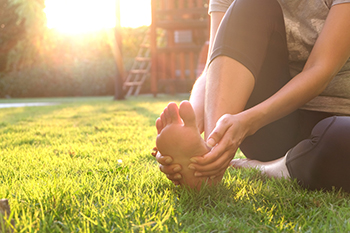
A plantar fibroma is a benign and non-cancerous growth that forms on the thick band of tissue on the bottom of the foot known as the plantar fascia. These fibromas typically develop slowly and are often painless, but they can cause discomfort or pain when pressure is applied. The exact cause of plantar fibromas is not fully understood, but they are thought to be related to genetic factors or trauma to the foot. Treatment for plantar fibromas depends on their size and the level of discomfort they cause. Non-surgical options such as orthotics, or corticosteroid injections may help to alleviate symptoms. However, in more severe cases, surgical removal of the fibroma may be necessary to relieve pain and restore foot function. Early diagnosis and intervention are essential to effectively manage plantar fibromas and prevent complications. If you have a growth on the bottom of your foot, it is suggested that you confer with a podiatrist who can diagnose a plantar fibroma, and offer treatment options that are correct for you.
A plantar fibroma may disrupt your daily activities. If you have any concerns, contact Dr. Edward D. Hutson of Easton, PA. . Our doctor can provide the care you need to keep you pain-free and on your feet.
Plantar Fibroma
A plantar fibroma is a fibrous knot in the arch of the foot. It is embedded in the plantar fascia which is a band of tissue that extends from the heel to the toes along the bottom of the foot. There can be multiple plantar fibromas in the feet at the same time. There are no known causes for this condition. If you have a plantar fibroma, there will be a bump in the arch of your foot that cannot be missed. Any associated pain is most often due to a shoe rubbing against the nodule. Non-surgical options, such as steroid injections, physical therapy, and orthotics should be tried first. Surgery is a last resort and is the only thing that will remove a plantar fibroma entirely. Consult with a podiatrist for a proper diagnosis and to determine the treatment regimen that is right for you.
What Causes a Plantar Fibroma?
While there are no specific causes identified, a plantar fibroma can possibly come from genetic predisposition or the formation of scar tissue that forms from healing the tears in the plantar fascia.
What Are the Symptoms of a Plantar Fibroma?
There will be a noticeable lump in the arch of the foot that may or may not cause pain. If pain is felt, it is typically because a shoe is rubbing up against the lump or when walking or standing barefoot.
Treatment and Prevention
A plantar fibroma will not disappear without treatment, but it can get smaller and be a non-issue. If pain persists, a podiatrist examines the foot and when the arch of the foot is pressed, pain can be felt down to the toes. An MRI or biopsy might be performed to help diagnose or evaluate the plantar fibroma. The following non-surgical options are generally enough to reduce the size and pain of these nodules:
Surgery is considered if the mass increases in size and the patient continues to feel pain after non-surgical methods are tried.
If you have any questions please feel free to contact our offices located in Easton, and Northampton, PA . We offer the newest diagnostic tools and technology to treat your foot and ankle needs.
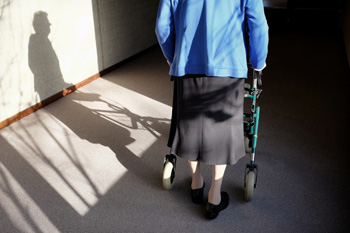
Maintaining proper foot health is crucial for elderly individuals as it ensures comfort, mobility, and independence. If a senior has a caregiver, they can play a vital role in assisting them with their foot care between podiatrist appointments and pedicures. Incorporating a regular foot care routine can significantly benefit their overall well-being. Foot soaks can be a soothing and effective way to soften toenails before trimming them straight across and filing the edges. This helps prevent ingrown toenails and ensures proper nail maintenance. Moisturizing the feet regularly is essential to prevent cracked heels, which can be uncomfortable and lead to complications. Foot massages are not only a luxurious treat but also aid in improving blood circulation, relieving tension, and providing comfort to aging feet. Gently massaging the feet can be a relaxing and enjoyable activity for both seniors and caregivers. Choosing supportive footwear that fits well is essential for seniors. Ill-fitting shoes can cause discomfort and increase the risk of foot problems and falling. In addition to regular at-home foot care, regular check-ups and preventative care advice from a podiatrist can help identify and address potential foot issues before they become more significant problems.
Proper foot care is something many older adults forget to consider. If you have any concerns about your feet and ankles, contact Dr. Edward D. Hutson from Easton, PA. . Our doctor can provide the care you need to keep you pain-free and on your feet.
The Elderly and Their Feet
As we age we start to notice many changes in our body, but the elder population may not notice them right away. Medical conditions may prevent the elderly to take notice of their foot health right away. Poor vision is a lead contributor to not taking action for the elderly.
Common Conditions
Susceptible Infections
Diabetes and poor circulation can cause general loss of sensitivity over the years, turning a simple cut into a serious issue.
If you have any questions please feel free to contact our offices located in Easton, and Northampton, PA . We offer the newest diagnostic and treatment technologies for all your foot and ankle needs.
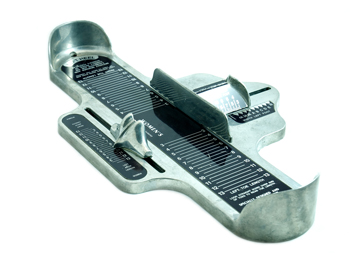
A proper shoe fit is vital for maintaining foot health and overall comfort. The feet should be measured regularly as shoe size can change over time and with age. Shoes should have ample space in the toe box, allowing the toes to wiggle comfortably, and they should provide adequate arch support and heel stability. Avoid footwear that feels excessively tight or loose, as these may lead to painful issues like blisters, corns, and calluses. When trying on shoes, it is important to walk around and check for any discomfort or friction. People with specific foot conditions or concerns should opt for shoes that cater to those needs, such as orthopedic or wide-width options. If you have complex foot issues, chronic pain, or need additional help selecting properly fitting shoes, it is suggested that you make an appointment with a podiatrist for personalized advice.
Finding a properly-fitting shoe is important in reducing injuries and preventing foot problems. For more information about treatment, contact Dr. Edward D. Hutson from Easton, PA. . Our doctor will treat your foot and ankle needs.
Proper Shoe Fitting
A common concern when it comes to foot health, having properly fitted shoes can help prevent injuries to the foot. Out feet affect our posture and gait, which in turn affects the biomechanics and overall bodily structure. With 33 joints, 26 bones, and over 100 ligaments, the potential for serious injury is much greater than one realizes. Although the feet cease growth in adulthood, they still change shape as they mature. Here are some factors to consider when it comes to investing in proper fitting shoes:
Keeping in mind how shoes fit the biomechanics of your body, properly-fitting shoes are vitally important. Fortunately, it is not difficult to acquire footwear that fits correctly. Be sure to wear shoes that support the overall structure of your body. Do your feet a favor and invest in several pairs of well-fitted shoes today.
If you have any questions please feel free to contact our offices located in Easton, and Northampton, PA . We offer the newest diagnostic and treatment technologies for all your foot and ankle needs.